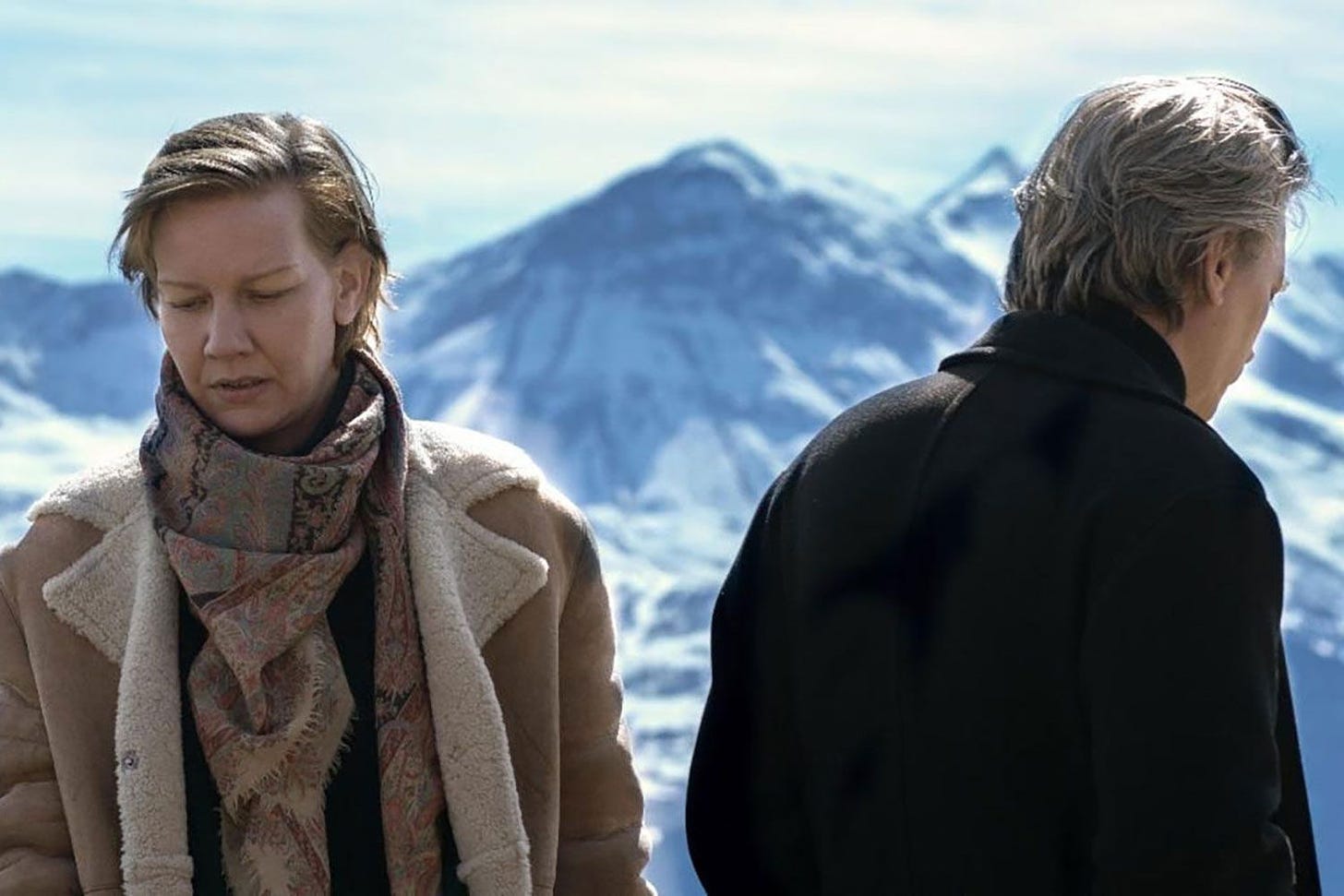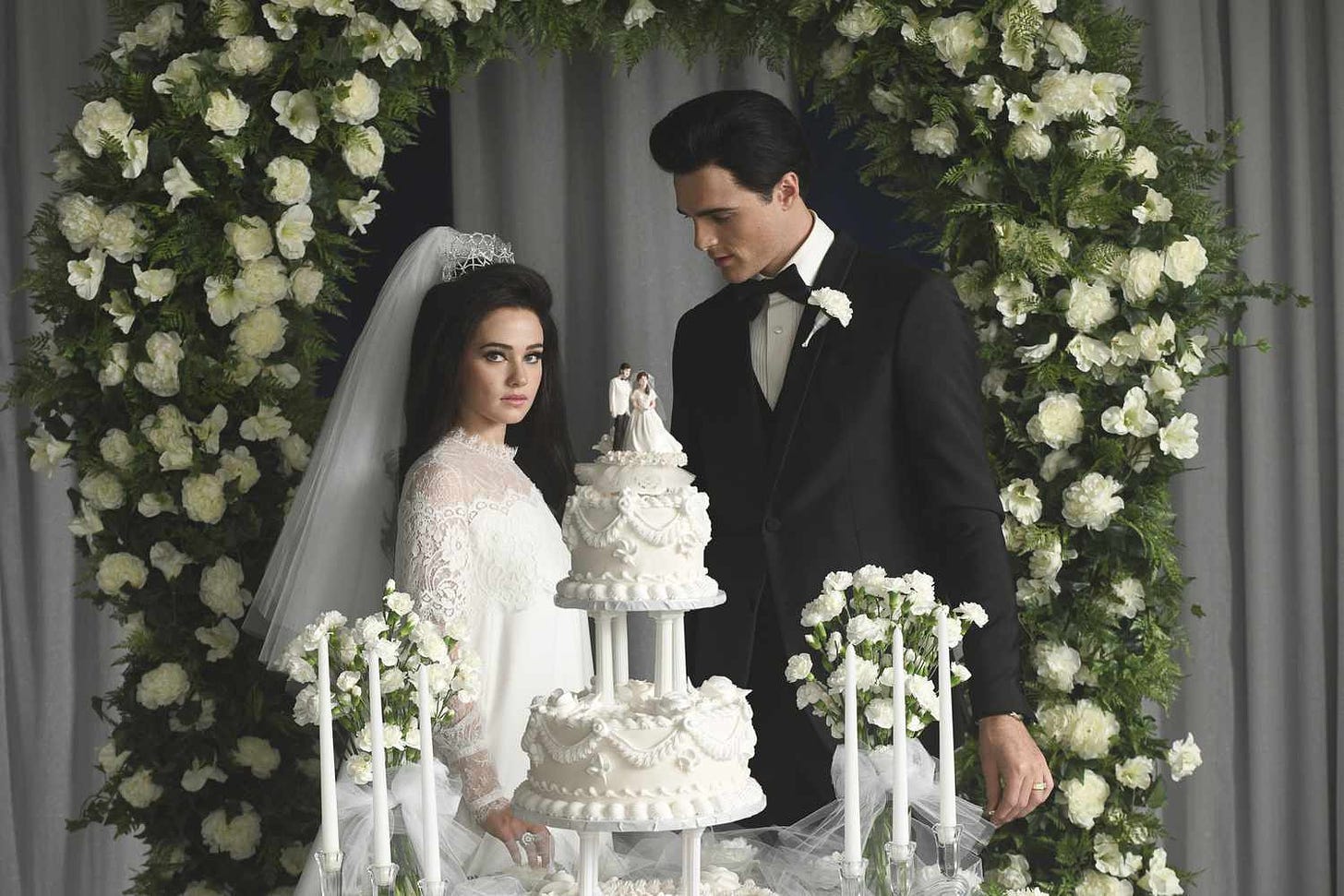In Review: 'Anatomy of a Fall,' 'Priscilla'
New films offer two portraits of troubled marriages.
Anatomy of a Fall
Dir. Justine Triet
152 min.
When the body of Samuel Maleski is found face-down in the snow outside the French chalet he shares with his wife Sandra Voyter (Sandra Hüller), a novelist, and their partially blind son Daniel (Milo Machado-Graner), the one important detail to investigators is that he suffered a blunt-force trauma to the head before hitting the ground. Could he have knocked it against the roof of the shed on the way down during a suicide attempt? Or did Sandra strike him with an object and push him from the top-floor balcony? The Palme D’Or-winning Anatomy of a Fall withholds the answer from the audience and piles on the ambiguities, essentially turning us into jurors who may know a little more than the pool brought in to administer justice in the case, but are kept at arm’s length from the truth. Co-writer/director Justine Triet wants us to think about other truths instead: The tensions within a marriage, the way the French criminal court sorts through testimony and evidence, and the fact that justice, like poor Daniel, is sometimes doomed to be partially blind.
There may have been more overtly dazzling films out of Cannes this year, but Anatomy of a Fall recalls top-drawer Sidney Lumet in its unfussy commitment to dramatic clarity and outstanding performances from the actors. The set-up alone is subtly masterful in how it lays out the critical pieces of the case—the before and after “the fall”—and beckons us to think again later about the small details that we might have witnessed. We know that Sandra has to cut short an interview with a graduate student because her husband is deliberately blasting a steel-drum cover of 50 Cent’s “P.I.M.P.” on repeat a couple of floors above. We know that Daniel has taken the family dog (and deserving Palme Dog winner) Snoop for a walk and that he discovers his dad’s prone body on the driveway when they get back. The time gap in between is a matter for the police and, eventually, the courts once Sandra is indicted.
Though there are critical scenes at the chalet throughout the film and one astonishingly powerful flashback to an argument between Sandra and Samuel, Anatomy of a Fall is a courtroom drama that will remind many of Saint Omer, Alice Diop’s fine docudrama from last year about the true case of a French-Senegalese woman who left her child to drown on a beach in Northern France. Courtroom dramas are a standard subgenre on film and TV, but here, as in Saint Omer, the proceedings are strikingly different from American criminal courts—and, as it happens, much better suited to emotional fireworks. As presented in Anatomy of a Fall, the procedural walls we’re used to seeing during witness questioning are knocked down, leading to more open and contentious arguments involving the witness, both lawyers, and the judge, who will interject whenever she pleases. The search for truth, then, can seem like a free-for-all where multiple voices compete for domination, but the conversational flow feels natural, too, in getting to the heart of the matter.
Triet seems aware that viewers will naturally align themselves with Sandra and hope she can wriggle out of a misunderstanding, but Triet and Hüller, in a fiercely intelligent and prickly turn, hold her flaws up to the light. This was indeed a troubled and fractious marriage, rocked at various times by jealousy and infidelity, and it wouldn’t be unimaginable for it to end in violence. As poor Daniel, the only witness, absorbs all this information in court—to say nothing of the public feeding frenzy outside of it—he learns painful information about his parents’ relationship they tried to shield from view. He has to come to his own conclusions and when he finally gets to the stand, Machado-Graner, as Daniel, presents his decision with heart-shattering resolve.
There’s nothing canned about Anatomy of a Fall, nothing as open-and-shut as a courtroom drama that ends in a dramatic revelation and a clear verdict—at least not a revelation and a verdict that satisfies all the questions we might have in our minds. Triet is keen to the truth that justice is imperfect and often unsatisfactory, and the effect this case has on the surviving members of this family are hard to fathom, other than to imagine it as profound. It’s rare that a film lives so much in your mind afterwards. What happened to Samuel is just the first question. What happens after that is open-ended. — Scott Tobias
Anatomy of a Fall is in theaters now.
Priscilla
Dir. Sofia Coppola
113 min.
It’s obvious from the moment Priscilla introduces Priscilla Beaulieu, later to become Priscilla Presley (Cailee Spaeny), that she’s nobody’s fool. Approached by an airman at a diner on the grounds of the Air Force base where she lives with her family, Priscilla immediately puts up her guard. She’s not going to fall for some line about going to a party at the home of Elvis Presley, even if she’s well aware that Presley is stationed there, just like her stepfather. When she does meet Elvis (Jacob Elordi) at the party, where he holds court with a throng of family members and hangers-on, she’s both awestruck and wary. Why would the biggest star in the world want to spend time with a shy 14-year-old girl?
Why indeed? It’s to Priscilla’s credit that writer-director Sofia Coppola doesn’t provide any easy answers to this or any other question. To take the most generous possible view of a man in his twenties—even a man as courtly and soft-spoken as Elvis when in polite company—pursuing a teenager is to shrug and say love can’t be explained. But the same explanation doesn’t apply to some of Priscilla’s other experiences as Elvis’s girlfriend, then kept woman, then wife. Why does he reject her advances when they’re alone? Why must he dictate what she wears? What does he do when he’s away in Hollywood?
It’s almost certainly an accident of timing that Priscilla would arrive while Baz Luhrmann’s maximalist Elvis is still a fresh memory, but Priscilla makes for a striking contrast. It stays close by Priscilla’s side—Spaeny’s absent from the film only fleetingly—capturing her confusion as she’s caught up in a family and entertainment machine (the lines get blurry) driven in large part by Elvis’s passions and peculiarities. Coppola opts for an elliptical approach. In one scene, Elvis becomes fixated on trendy spiritual books, turning peevish when Priscilla declines to share his enthusiasm. A few years later, after a talk with the never-seen Colonel Parker, the books fuel a bonfire in the backyard of Graceland. Working from Priscilla Presley’s 1985 memoir Elvis and Me, Coppola focuses on specific details of Priscilla’s life with Elvis while letting the outside world blur. It’s never clear how much time is passing by from scene to scene. When Priscilla arrives at preparation for the 1968 comeback special, it arrives as a shock. Didn’t they just get married?
That sense of isolation and claustrophobia is part of what makes the film so effective. Priscilla leaves her parents for a life at Graceland in which Elvis’s father Vernon (Tim Post) keeps her on a tight leash via a meager allowance. She rarely leaves Graceland, where she’s forbidden to distract the employees or linger in the front yard, because her presence creates a spectacle. In Elvis’ frequent absences she has little to do. When he’s around, she has to suffer through whatever fixations possess him at the moment or play the role of one of the boys as the Memphis Mafia takes target practice in the backyard or gets into other shenanigans. It’s a dream-come-true life in which one disappointment follows another.
Convincing as Priscilla from her teenage years to the end of her marriage, Spaeny delivers a remarkably vulnerable performance that never treats her as a victim. Lost in a situation that gives her many opportunities to lose herself—to the demands of her famous husband, to the pills that flow freely through Graceland—she retains an innate willfulness that’s an animating spark at the center of Coppola’s quiet, sad movie. It’s a true behind-the-scenes story not because of the now well-known details of Elvis’s private life it depicts, but the ways it reveals the darkness and loneliness of a space just inches away from the spotlight. —Keith Phipps
Priscilla is in theaters now.









Ha, the Palm Dog from 2009: Antichrist, The Fox (rules were bent)
Loved Anatomy of a Fall, and I’m interested to see what kind of legs it has in awards season. It’s the kind of thing I could see attracting a decent audience, with its strong hook and the true crime dressings, but it’s also long, and French, and necessarily alienating.
Also, I joked in another thread that Snoop deserved a dog Oscar--I had no idea that was an actual thing! Good boy, Snoop.